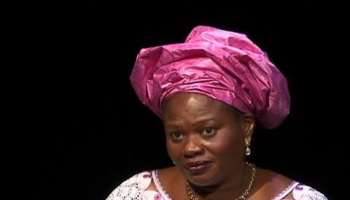Nollywood: An industry in crisis?
In 1992, the debut of Kenneth Nnebue's movie Living in Bondage brought a new twist to the then growing motion picture industry in Nigeria.
Shot straight-to-video, it was the first Nollywood blockbuster movie which kicked-off the Nigerian cinema industry.
By the following year, more filmmakers tapped into this eye-opening trend and Nollywood was born.
Nollywood productions need no introduction in Africa.
Millions of viewers on the continent watch Nollywood movies everyday, in movie cafes, on free and pay TV, and at home because they are easily available.
A selling point for these movies also, has been the typical African storylines that resonate with many of their viewers.
However, today, Nollywood's growth has been stunted by piracy and lack of professionalism.
It has become an free-for-all affair and avenue for people to attain cheap fame and make a quick buck.
From Ghana, Zimbabwe, South Africa, Botswana, Tanzania, Kenya to Egypt, most of what is known about Nigeria as a country has been through Nollywood.
Yet little or no attention has been paid to the money-spinning industry that would have been a good source of revenue for the country.
Efforts by current investors in the industry have been bedevilled by piracy.
Taiwo Ajai-Lycette, a veteran Nigerian stage actress who featured in many productions in Nigeria including a TV series in the 1970s, Winds Against My Soul, expresses her angst with the quality of production and the quantity of works spurned by directors whom she says are not in tune with the times.
Not conversant
“We don't have to be at the state we are now when it comes to film-making in this 21st Century,” she said. “There are new technologies which some filmmakers are not conversant with. I am knocking the quality. Veteran artistes are those who have travelled on stage. The basic knowledge that you acquire as an actor is on stage which many actors today don't have.”
She said the problem today is that people want to be part of Nollywood to gain cheap popularity, and that this kind of bankrupt thinking has led Nollywood to the stagnant position it is currently.
“You can't make money without making incredible art,” adds Ajai-Lycette. “You have to be an artiste to make it in the industry. Money is a by-product of creativity. It should come as a direct product of what we do. If we only think of the money, we are going to be poor as artistes. Thinking is a very hard business.”
Most Nigerian films are characterised by badly written scripts which lack depth.
Film critics have traced this to the lack of a reading culture among scriptwriters, directors and actors. And to be an artist, in Ajai-Lycette's words, “is to be absolutely widely read.”
Weak scripts
She argues that if an artiste is not educated there is no way he can interpret the works of Wole Soyinka, for example, because as a writer, he translates the philosophy of his people.
Nollywood actress Kate Henshaw-Nuttal agrees that there is poor quality of work in Nollywood, and the fact that Ajai-Lycette rejected the script sent to her.
“It's almost three years now,” she explained, “ since I starred in a Nollywood movie. I believe I have reached a point where I have come to be known for good quality work. If the prop guys pay attention to detail and the directors do their work well, Nollywood will be a better industry.”
While some practitioners decry poor quality of production, others like Dejumo Lewis take issue with the name of the industry itself, Nollywood, which is a derivative of America's Hollywood.
“Nollywood is not original. The name Naija Movies would be best.”
In addition, he has a problem with the way Nigerian culture is portrayed.
“Art is about stating the reality and the ideal,” he said. “It must mirror and give what should be. We should ask ourselves what kind of culture we communicate through our works.”
As a developmental step for the entertainment industry, President Goodluck Jonathan last November announced the federal government's investment of $200 million into the development of the entertainment industry.
And in January this year, the president through Olusegun Aganga, the minister for finance, announced that the Special Entertainment Fund will be disbursed by the Bank of Industry as single-digit interest rate loans.
It is the first time in Nigeria that the federal government will make such funds available for the entertainment industry of which Nollywood is a big part.
Latest News
-
 Influencer Nickie Dabarbie Lays Strong Allegations
Influencer Nickie Dabarbie Lays Strong Allegations -
 Small Money" : Daniel Regha Berates Nasboi New Son
Small Money" : Daniel Regha Berates Nasboi New Son -
 “Why You No Gree Get Belle For Me": Portable Quest
“Why You No Gree Get Belle For Me": Portable Quest -
 “Men Are Crazy"; Brymo Questions Tiwa Savage
“Men Are Crazy"; Brymo Questions Tiwa Savage -
 Daniel Regha Admonishes Ruger Over His Recent Comm
Daniel Regha Admonishes Ruger Over His Recent Comm -
 Ruger Faces Backlash From Netizens Over Boat Cruis
Ruger Faces Backlash From Netizens Over Boat Cruis -
 Daniel Regha Mocks Government, Speaks On Cubana Ch
Daniel Regha Mocks Government, Speaks On Cubana Ch -
 Emoney Promises To Sponsor Children Of Late Junior
Emoney Promises To Sponsor Children Of Late Junior -
 My Crush Made Me Leave Acting For Slinging-Tiwa Sa
My Crush Made Me Leave Acting For Slinging-Tiwa Sa -
 Division Among Nigerians As Cubana Chief Priest Is
Division Among Nigerians As Cubana Chief Priest Is














